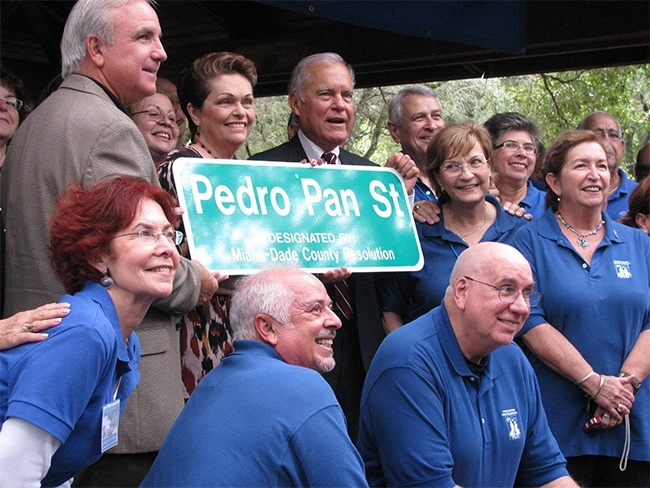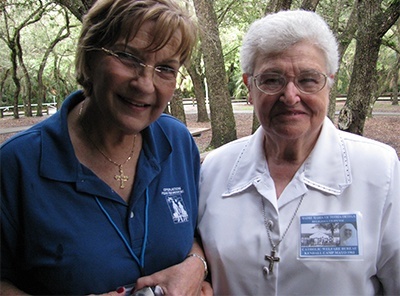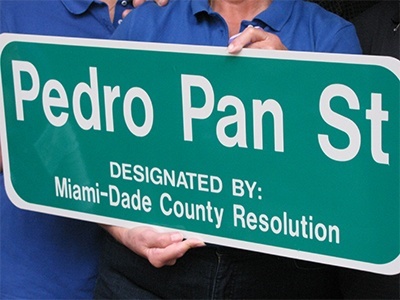By Rocio Granados - La Voz Catolica

Photographer: ROCIO GRANADOS | LVC
Miami-Dade Mayor Carlos Gimenez, Commissioner Rebeca Sosa and Commissioner Javier Souto hold the Pedro Pan Street plaque surrounded by former Pedro Pan children.
KENDALL | �The children would come. I remember. I will never forget. A four-year-old child, with a sign that read: �My dad�s name is� my mom�s name is� and this is my number.�
��Later there was a little Chinese boy � who would say: �I want to speak to my dad�� One of the sisters would tell him: �You can�t, because you know they listen to phone conversations and they can do something to your dad, because you are here.�� �No! I will speak to him in Chinese,� he would respond.�
These are some of Sister Maria Victoria Ortega�s recollections of the children who came from Cuba without their parents in the early 1960s, and were brought to a camp in Kendall as part of the Pedro Pan exodus. Five decades later, the memories still move her to tears.
 Sister Ortega came to work at the camp at age 23, after Fidel Castro�s regime closed all the Catholic and private schools on the island, including the one where she worked, Our Lady of Lourdes.
Sister Ortega came to work at the camp at age 23, after Fidel Castro�s regime closed all the Catholic and private schools on the island, including the one where she worked, Our Lady of Lourdes.
A Sister of St. Philip Neri, she shared her recollections during a gathering Nov. 22 of about 100 former Pedro Pan children at the site of the Kendall camp, now Kendall Indian Hammocks Park. They came together for the renaming ceremony of a portion of S.W. 80th Street, between 107th and 114th Avenues, as Pedro Pan Street.
The camp filled quickly, said Sister Ortega. �A lot of girls started coming. Every day there would be about 15 to 20. At one point we had to look for beds in the boys� side,� she recalled. �There were more than 100 girls and there were only 20 beds. They were bunk beds; the beds would be put together and there would be another and another.�
Between 1960 and 1962, Operation Pedro Pan � organized by the Catholic Church in Miami � sheltered more than 14,000 children who arrived from Cuba without their parents. The Kendall Camp was one of eight different refuges and temporary camps that were established for the children here.
�One of the reasons our parents sent us here was to save us from the communist doctrine and to preserve our faith. The majority of us were Catholics,� said Carmen Roma�ach, immediate past president of Operation Pedro Pan Group. She arrived at the Kendall Camp at age 15, along with her brothers, one 11 and another 7 years old.
�For us it is important that those places where we were housed retain something to show that we were there, a reminder of how our parents sacrificed to save us so we would be able to practice our faith freely,� said Carmen Valdivia, president of the Pedro Pan group, who arrived at the Florida City camp at age 12, along with her 14-year-old sister.
 Also taking part in the renaming ceremony were Miami-Dade Mayor Carlos Gimenez; Commissioners Rebeca Sosa and Javier Souto; and Jack Kardys, the county�s director of Parks, Recreation and Open Spaces.
Also taking part in the renaming ceremony were Miami-Dade Mayor Carlos Gimenez; Commissioners Rebeca Sosa and Javier Souto; and Jack Kardys, the county�s director of Parks, Recreation and Open Spaces.
�The Pedro Pan program was born out of love,� said Mayor Gimenez. �The love of the people who came to help others to have a better life. A lot of parents,� he pointed out, �wanted freedom for their children. Today we are gathered in the Kendall Camp, where many Pedro Pan children began their lives in this country.�
Sister Ortega now lives with other sisters of St. Philip Neri in the convent at St. Jerome Parish in Fort Lauderdale, where they work at the school.
She says she feels grateful: �I don�t recall a child (from Pedro Pan) complaining of that era; on the contrary, their parents struggled to send their children to freedom.�
��Later there was a little Chinese boy � who would say: �I want to speak to my dad�� One of the sisters would tell him: �You can�t, because you know they listen to phone conversations and they can do something to your dad, because you are here.�� �No! I will speak to him in Chinese,� he would respond.�
These are some of Sister Maria Victoria Ortega�s recollections of the children who came from Cuba without their parents in the early 1960s, and were brought to a camp in Kendall as part of the Pedro Pan exodus. Five decades later, the memories still move her to tears.

Photographer: ROCIO GRANADOS | LVC
Carmen Romanach, past president of Operation Pedro Pan, poses with Sister Maria Victoria Ortega of the Sisters of St. Philip Neri, who cared for the unaccompanied minors who arrived from Cuba in the early 1960s.
A Sister of St. Philip Neri, she shared her recollections during a gathering Nov. 22 of about 100 former Pedro Pan children at the site of the Kendall camp, now Kendall Indian Hammocks Park. They came together for the renaming ceremony of a portion of S.W. 80th Street, between 107th and 114th Avenues, as Pedro Pan Street.
The camp filled quickly, said Sister Ortega. �A lot of girls started coming. Every day there would be about 15 to 20. At one point we had to look for beds in the boys� side,� she recalled. �There were more than 100 girls and there were only 20 beds. They were bunk beds; the beds would be put together and there would be another and another.�
Between 1960 and 1962, Operation Pedro Pan � organized by the Catholic Church in Miami � sheltered more than 14,000 children who arrived from Cuba without their parents. The Kendall Camp was one of eight different refuges and temporary camps that were established for the children here.
�One of the reasons our parents sent us here was to save us from the communist doctrine and to preserve our faith. The majority of us were Catholics,� said Carmen Roma�ach, immediate past president of Operation Pedro Pan Group. She arrived at the Kendall Camp at age 15, along with her brothers, one 11 and another 7 years old.
�For us it is important that those places where we were housed retain something to show that we were there, a reminder of how our parents sacrificed to save us so we would be able to practice our faith freely,� said Carmen Valdivia, president of the Pedro Pan group, who arrived at the Florida City camp at age 12, along with her 14-year-old sister.

Photographer: ROCIO GRANADOS | LVC
Sign designating S.W. 80th Street between 107th and 114th avenues as Pedro Pan Street.
�The Pedro Pan program was born out of love,� said Mayor Gimenez. �The love of the people who came to help others to have a better life. A lot of parents,� he pointed out, �wanted freedom for their children. Today we are gathered in the Kendall Camp, where many Pedro Pan children began their lives in this country.�
Sister Ortega now lives with other sisters of St. Philip Neri in the convent at St. Jerome Parish in Fort Lauderdale, where they work at the school.
She says she feels grateful: �I don�t recall a child (from Pedro Pan) complaining of that era; on the contrary, their parents struggled to send their children to freedom.�

